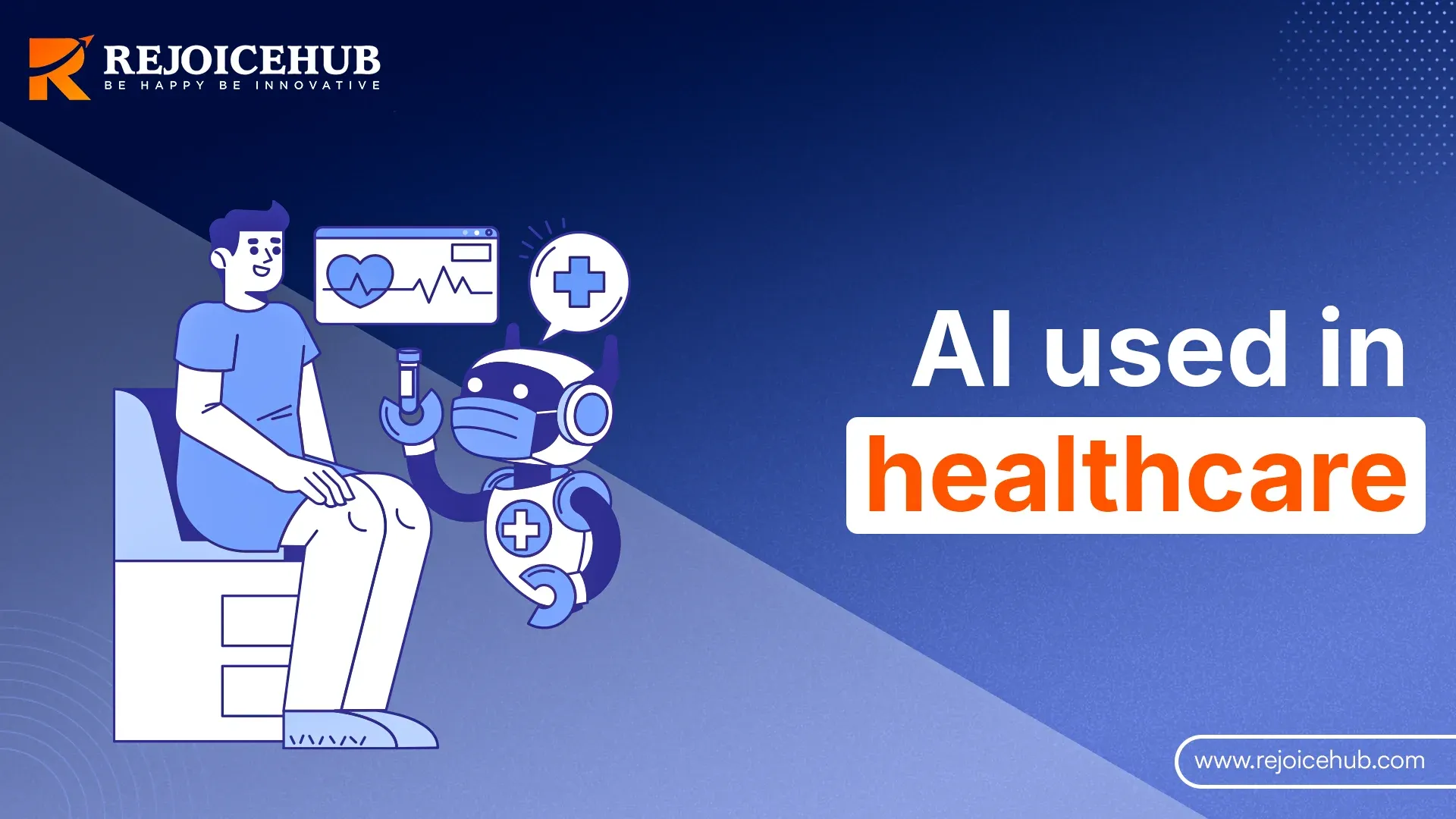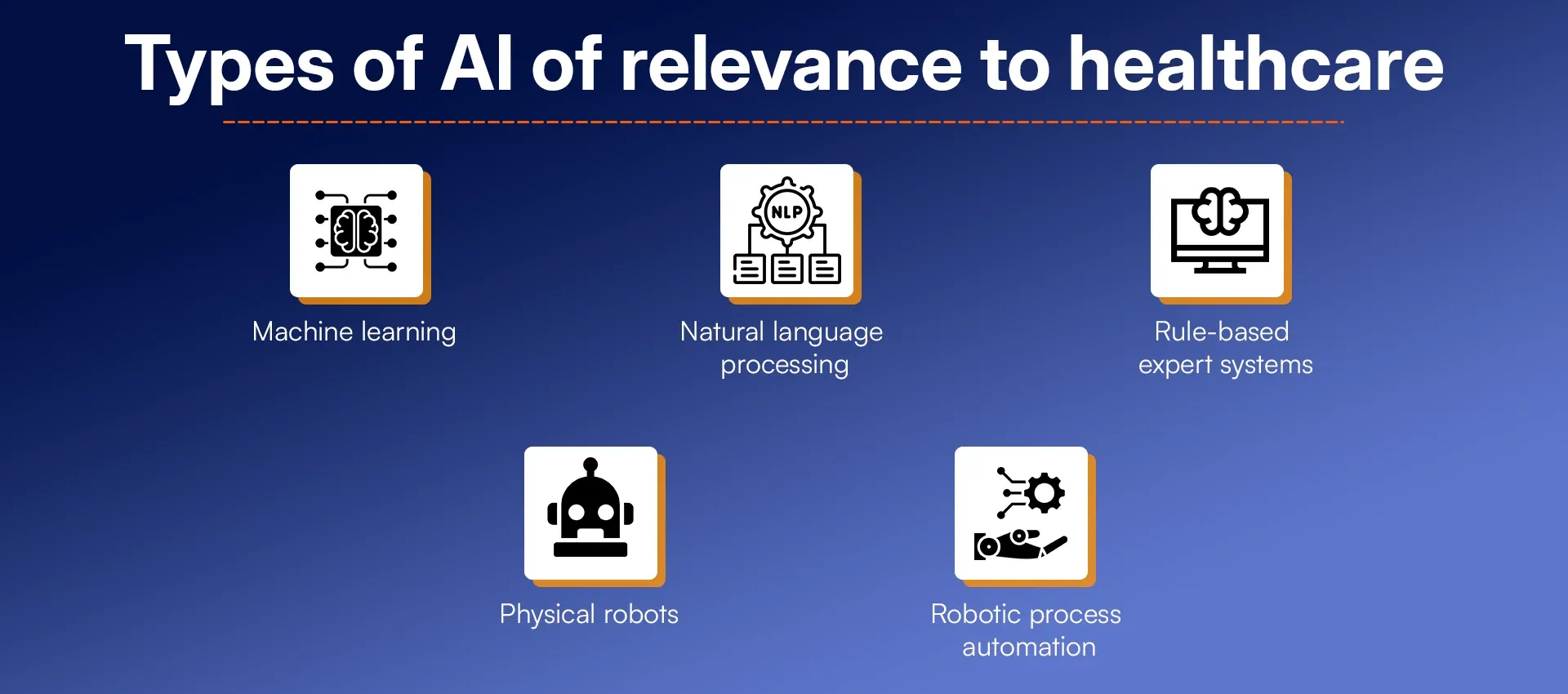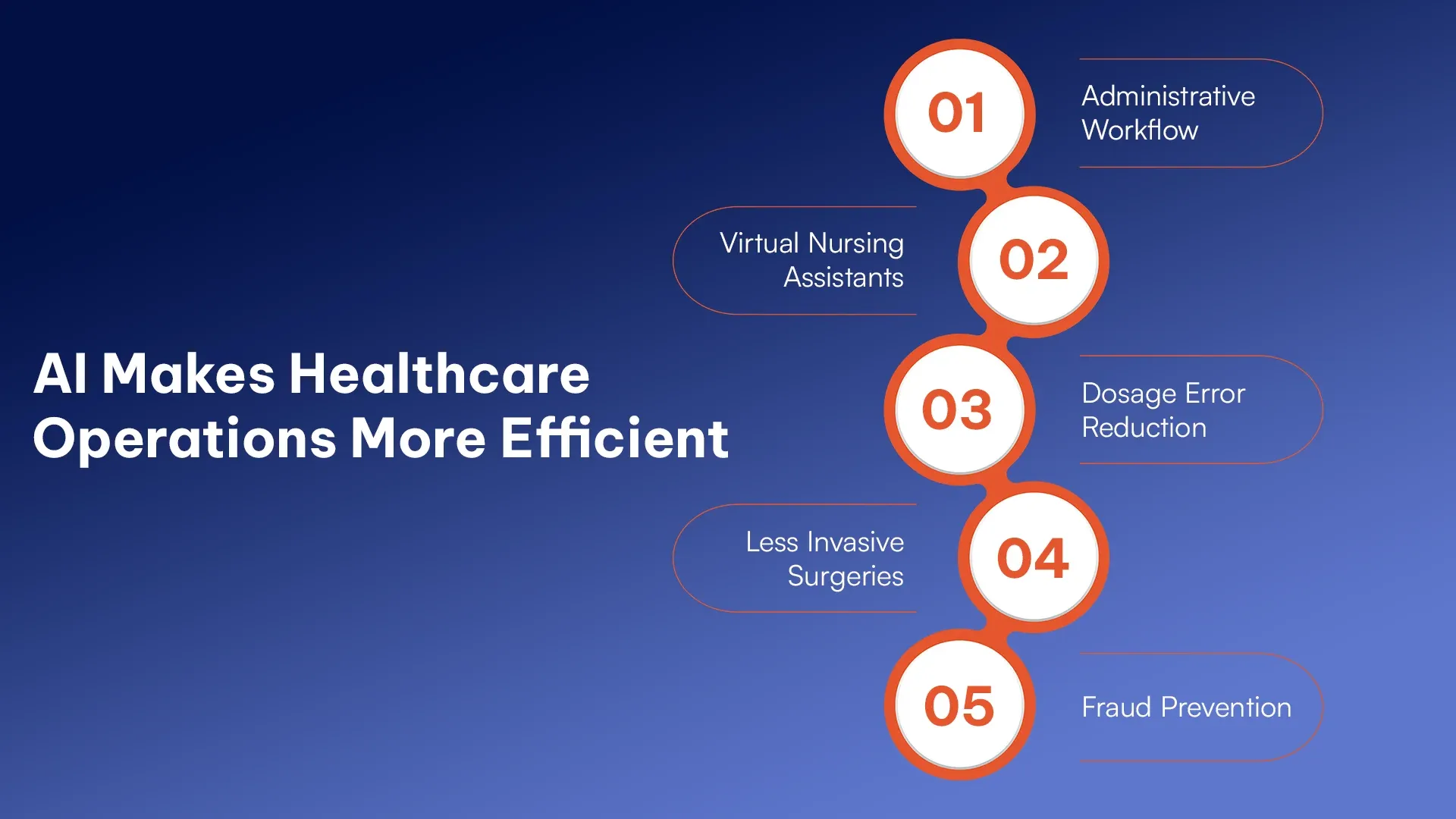
AI is showing a lot of promise recently. It is beginning to establish a presence in every field that it comes across. AI is bringing about a major shift in how healthcare works. AI’s been there for quite some time now. But, now it has picked up pace. It's advancements in machine learning, natural language processing etc. are commendable. Let’s look at how AI is impacting and contributing to healthcare.
What is Artificial Intelligence in Healthcare?
Healthcare AI is using technologies like machine learning, natural language processing and robotics to provide services.
It aims to perform tasks that typically require human intelligence. AI shows promise in diagnosing diseases and predicting patient outcomes to optimizing administrative workflows.
Types of AI of Relevance to Healthcare
AI is a broad field. So, let’s go through some of the forms of AI that are relevant to healthcare.

1. Machine Learning – Neural Networks and Deep Learning
Machine learning (ML) focuses on training algorithms. It helps recognize patterns in data. It helps analyze medical images (such as X-rays, MRIs and CT scans). It also helps predict disease progression and aids in developing personalized treatment plans.
That being said, neural networks and deep learning represent advanced forms of ML – they help process complex datasets. This leads to them helping in image recognition and predictive analytics.
2. Natural Language Processing (NLP)
NLP helps computers understand human language. Be it spoken or written. It can be used to analyze medical records, extract information from unstructured data as well.
NLP assists in communication between patients and healthcare providers.
3. Rule-Based Expert Systems
These systems rely on predefined rules to perform tasks. It offers a simple form of AI as compared to machine learning.
These systems help decision making, disease diagnosis and also recommend treatments. They lack the learning capabilities of ML, but are effective for repetitive tasks and well-defined problems.
4. Physical Robots
Robots perform tasks ranging from surgery all the way to physical therapy.
Surgical robots allow for precision in procedures, reducing recovery times and complications. Regarding rehabilitation, these can also assist patients in regaining mobility. They help deliver supplies to the hospital itself, and reduce the workload of healthcare staff.
5. Robotic Process Automation (RPA)
RPA can be used to automate administrative processes. These include billing, scheduling and data entry. With that, it also helps healthcare organizations streamline operations and reduce error, freeing up human staff to focus on more complex tasks.
Examples of AI in Healthcare
AI is transforming healthcare through improved drug discovery, increased diagnostic accuracy, efficient management of large healthcare data, personalized patient care, and precision in robotic surgeries. All these applications are improving the operational flow, cutting down costs, and improving patient outcomes.
AI in Drug Discovery
AI speeds up the discovery of potential drug candidates by screening massive datasets of chemical compounds, biological pathways, and genetic information. It reduces the time and cost of taking new drugs to market.
AI in Medical Diagnosis
AI-based tools analyze medical images, lab tests, and patient histories to diagnose diseases such as cancer, cardiovascular diseases, and neurological disorders with a high level of accuracy. Some examples include radiology image analysis and pathology diagnostics.
AI in Healthcare Data Management
AI processes, manages, and mines huge volumes of patient data, which improves the quality of decisions, detects trends, and increases operational efficiency. It supports EHR systems by automatically recording and retrieving data.
AI in Patient Experience
AI allows for better patient care through personalized recommendations, scheduling appointments, and virtual health assistants to help with chronic conditions or answer health-related questions.
AI in Robotic Surgery
Robotic systems for AI drive the improvement of accuracy, stability, and visualization during complex surgeries. These are often equipped with real-time imaging and analytics for better outcomes and faster recoveries.
Advantages & Disadvantages of AI in Healthcare
AI in healthcare enhances diagnostics, treatment, and patient care by improving accuracy, efficiency, and personalization. It streamlines administrative tasks, reduces human error, and accelerates drug discovery. However, challenges include high implementation costs, data privacy concerns, potential biases in algorithms, and reduced human interaction. Balancing AI with human expertise is crucial for ethical and effective healthcare
Advantages of AI in Healthcare
- Improved Diagnosis: AI helps to increase accuracy and early detection of diseases.
- Efficiency: Automates redundant work, saves time, and minimizes administrative tasks.
- Personalized Care: Individualized treatment plans and recommendations.
- Cost Savings: Reduces operational costs due to optimization of workflow and resource utilization.
- Better Patient Outcomes: Enabling precision medicine and minimally invasive procedures.
Disadvantages of AI in Healthcare
- High Costs: Developing AI systems can be costly.
- Data Privacy Risks: There is a risk of exposing sensitive patient data.
- Bias in AI: Algorithms may amplify the biases present in the data.
- Job Displacement: Some jobs might experience decreased demand as a result of automation.
- Reliability Concerns: Dependence on AI could lead to errors if systems fail or are misused.
Diagnosis and Treatment Applications
AI is transforming healthcare through its ability to improve diagnostic accuracy. Not only that, but it also helps in treatment planning.
AI can analyze massive amounts of patient data, identifying patterns that can be missed by human clinicians. This leads to earlier and more accurate diagnoses.
AI can analyze patient data alongside the latest clinical research, helping physicians create highly personalized treatment plans.
Patient Engagement and Adherence Applications
AI-powered apps and chatbots can provide patients with real-time information about conditions, helping them stay on track with medication reminders and even helping with virtual consultations.
AI can also state if any patient is deviating from their treatment plans. This can help provide timely interventions, improving adherence as well.
Also read this article : Generative AI in healthcare industry
Administrative Applications
AI systems are now automating tedious and time-consuming tasks like scheduling appointments and managing insurance claims.
AI-driven systems can optimize scheduling by predicting no-shows and adjusting appointments accordingly. They streamline billing, lowering the risk of human errors and speeding up claims processes.
Implications for the Healthcare Workforce
With the rise in AI, comes its many implications as well. While it can automate tasks, it isn’t expected to replace healthcare professionals anytime soon. Instead, it will augment their roles by taking over routine tasks – letting doctors focus on more complex tasks.
For example, AI can handle administrative work that bogs down healthcare workers.
Ethical Implications
AI is a powerhouse. But as with every technology, AI brings ethical implications. These include patient privacy, data security and even algorithmic bias.
AI systems rely on vast amounts of data – the data used must be responsible and ethical in nature. AI needs to be trained on diverse populations, so that misdiagnoses are prevented, and preciseness is maintained.
Challenges for Artificial Intelligence in Healthcare
AI faces several challenges A big one is data privacy. Healthcare data is sensitive, it’s important that AI systems comply with privacy regulations like HIPAA.
Another major challenge is AI’s integration into existing healthcare infrastructures. Many organizations still rely on outdated technology, so it’s a little difficult to implement AI systems without an overhaul.
When Did AI Become Popular in Healthcare?
AI has been a part of healthcare for decades. But, it picked up pace in the 2010s.
It was when ML and big data analytics became popular, and large datasets became available that AI’s true potential was realized. AI systems like IBM’s Watson and Google’s DeepMind gained popularity as they can analyze data and assist in complex medical tasks.
How AI is Reshaping Decision-Making
AI provides clinicians with real-time insights and predictive analytics. It doesn’t rely fully on intuition of experience, it uses data to make decisions instead.
Be it while making plans or conducting surgeries, AI can help medical professionals loads.
AI Makes Healthcare Operations More Efficient

1. Administrative Workflow
AI helps automate tasks such as data entry, billing and scheduling. This reduces the burden on healthcare staff.
2. Virtual Nursing Assistants
AI-powered virtual assistants can monitor patients. They can help provide information and perform basic tasks like answering questions.
3. Dosage Error Reduction
AI can analyze vast datasets to recommend correct dosages, reducing the risk of adverse drug reactions.
4. Less Invasive Surgeries
AI assisted robotic surgery enables precise and less invasive procedures. This can lead to faster recovery times for patients.
5. Fraud Prevention
Unusual patterns in billing and claims data can help organizations in preventing fraud and reduce financial losses.
AI Improves the Healthcare User Experience
AI in medicine helps improve the overall experience for both patients and providers. Virtual assistants can provide patients with instant access to information. This leads to a reduced need for in-person visits.
With personalized care, the overall healthcare experience is improved loads.
The Future of Artificial Intelligence in Healthcare
The AI market in healthcare is bright, with AI and collaboration between healthcare providers.
New applications constantly emerge, and technologies are becoming more and more advanced. But, for AI to reach its full potential – healthcare providers must learn how to integrate it.
Collaboration between healthcare organizations, AI developers and regulatory bodies must be consistent. This is so that AI is used ethically and equitably. AI is continuing to evolve – but it can never replace the human element of care.
Learning to integrate it is the way to go.
Conclusion
So, now we know how integral AI has become in the field of healthcare.
It becomes important to understand that using AI for the greater good of both the patients and healthcare professionals is the way to go. Infusing AI into managing patients and delivering utmost healthcare is the main aim, the main goal that is to be achieved – all done for the welfare of patients.
At Rejoicehub LLP, we’ve got top-end artificial intelligence services for you. We help healthcare organizations become the best versions of themselves through technology that helps succeed. We’re one of the leading providers of AI technology in healthcare. Let’s develop and conquer together!
Frequently Asked Questions
1. What are the most common AI applications in healthcare?
AI can be used in areas such as diagnostics, treatment planning, administrative processes and much more. It also plays a major role in predictive analytics and robotic surgery.
2. Can AI replace healthcare professionals?
AI is designed to augment the skills of healthcare professionals, not replace them in any way. AI helps with stuff such as data analysis, decision support and helps automate routine tasks as well.
3. What are the main ethical concerns surrounding AI in healthcare?
With AI’s benefits, also come its concerns. Data privacy, algorithmic bias and transparency of AI decision-making processes are some of them. It can also induce an over-reliance on technology.